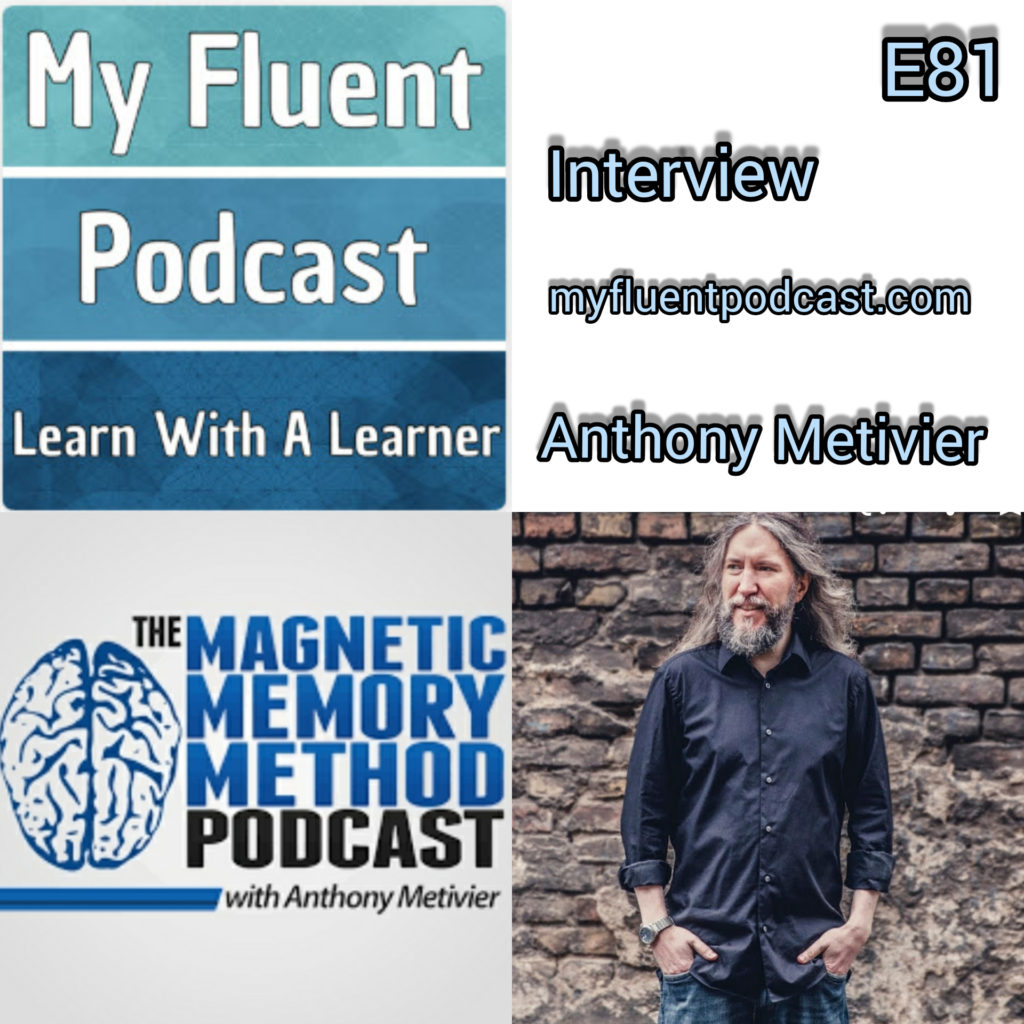
Listen to this episode and learn new things such as:
- What does being fluent mean?
- How does Anthony get by when speaking German?
- Why Anthony doesn’t struggle when it comes to learning a language
- How to overcome being overwhelmed! Goalsetting is the answer!
- The right mindset and acknowledging your fortune.
- Anthony’s next book will be about Zen 🙂
Links to sources mentioned in this episode
Anthony’s Podcast – learn more about learning techniques, meditation and many more.
5 Ultra Fun Ways To Super Boost Your Fluency – Episode of the magnetic memory method podcast
Tedx Talk – Two Easily Remembered Questions That Silence Negative Thoughts
Anthony’s YouTube Channel – Learn anything faster
Interview transcript (without the intro and outro)
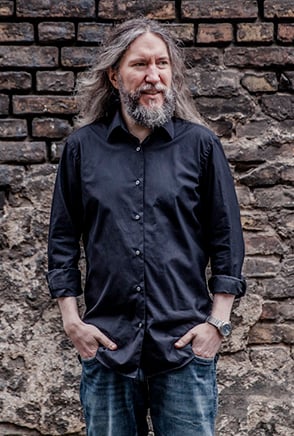
Who is Anthony Metivier?
My name’s Anthony Metivier and thanks for having me. I run magnetic memory method.com and my projects are many. I mean I did a PhD (PhD is an abbreviation for ‘Doctor of Philosophy’) years ago and I haven’t stopped being a scholar or a researcher. I don’t teach at university anymore. I did for a while but now I just have built sort of my own little university made out of a memory techniques and related topics. Yeah, you mentioned the victorious mind and read one of the most important passages. And now I’m working on another book and I just work on helping the people who go through my website and through the courses that I’ve made for memory training. And it’s a very wonderful and blissful thing to do.
About the Magnetic Memory Method podcast
Yeah. And you have an incredibly big catalog of podcast episodes. I think there are more than 300. If I am not mistaken.
Well, it changes because we sometimes remove episodes but yeah it’s floating around the 300 Mark.
I can also mention here that you had a lot of different language experts on your podcast as well. For example, Luca Lampariello, Timothy Moser, or Kris Broholm. And I think Kris Broholm has appeared several times.
No, I don’t. I don’t think Kris has ever been on the show. I’ve been on his show but I don’t think he’s been online. He should be though. I don’t remember if he’s been online but I think my memory is good enough that I would remember if he had been on the magnetic memory method podcast.
Okay then I guess that I was listening on Kris’ podcast where you appeared.
He’s a great guy. We want to get him on the podcast soon.
The meaning of being fluent
You even had an episode called “five ultra fun ways to super boost your fluency“. And in that context, I wanted to ask you what does it mean to you to be fluent?

Oh, it’s very simple. It’s being able to complete goals and to be able to communicate what you mean. And have it understood and then understand what people are saying. Now, notice that, understand what people are saying doesn’t mean necessarily every single word in every single sentence. So not everybody will agree with my definition of fluency but in my opinion, it’s just that simple.
Can you say what you want to say and be understood? And can you understand basically what people are saying to you? And I think that’s an important thing because we don’t even know our mother tongue fluently you know there’s lots of things people say to me, I have no idea what they’re talking about.
You know, I have to ask for clarification, right. And then I’ll say things to them and they have no idea what I’m talking about. Even though we’ve been native speakers since birth. So they have to ask me for clarification. So in other words, fluency is being able to accomplish missions. And if you get forwarded or if you quote unquote fail to accomplish (to succeed in doing or completing something) the mission of being understood and understanding. Then you just ask questions and if you can ask questions and get clarification and find a way to understand and be understood, then as far as I’m concerned you have achieved fluency.
Yeah, that makes completely sense to me. it’s also my definition of fluency.
So I’m not alone. That’s good.
Do you consider yourself fluent in German? I know that you were living in Germany.

Yeah, I think it’s just the wrong question. I think it’s a total wrong direction to travel. I can speak German very well. I mean, I talked to a school here in Brisbane where I live. Completely in German. I explained to them a research project that I want to do, and if they could help me and so forth, and I asked the person is my German.
Okay. I said, I don’t speak it very often anymore, but you know, she was like, super like your German is just fine. You could say I’m fluent in German, but I just think that’s just ignoring what we just said.
The point is, is I executed a mission. She understood what I was saying.
I understood all her clarifying questions and I’ll bet you any money in the school is called DER, DIE, DAS incidentally (used to introduce a new topic, or some extra information, or a question that you have just thought of). And I’ll bet you any money that I did not have proper grammar a lot of the time but the reality is you don’t need, like grammar is a false goal. I was understood. And so if I had a DER, when I should have had a DAS or whatever, grammatical morphological manifestation was meant to be there, it’s irrelevant (not important to or connected with a situation).
And yes, I lived in Germany and I used to ask people all the time and I stopped asking them. What is the grammar here? And they would say, you know, they’d say “Keine Ahnung”, which means no idea. And so when native speakers have no idea and you just speak with them and you’re understood and they understand you, then there’s no problem.
The only time that it ever pays to be like super sharp and even then it doesn’t necessarily always pay, would be like, In a tax office or some government thing where you know that they’re going to be super impressed, you know, but even then I’ve just spoken my best, know that I made mistakes, but I was understood.
They understood me. And the mission was accomplished.
Yeah. And you teach a lot about memory palaces and mnemonics and also memorization techniques. So I assume that you use these techniques as well to improve in German.
Oh, yeah. I never would have learned German if I hadn’t used these memory techniques, it’s just, not possible. I don’t know how anybody achieves any level of fluency without some kind of memory technique strategy. To use that word fluency that I didn’t want to use. Sorry. I’m contradicting myself. But yeah, I can’t imagine anybody reaching any level of proficiency.
Podcast episode:
How To Enhance Your Memory With Virtual Memory Palaces
Maybe that’s a better word without some sort of dedicated, detailed memory strategy. It doesn’t have to be the memory palace but every language learner is a memory expert at the end of the day. And they use memory techniques. It’s just a matter of which ones do they use and how well do they use them.
But I love the memory palace. I think it’s the best technique for many people. And it obviously is it’s lasted for thousands of years. And if you devote yourself to it, it will reward you in many, many ways, even if you don’t use it every single day or for every time purpose.
And have you ever contemplated to make a podcast in German or in another language than English?
Oh, yeah. Yeah. I think of it often, but, I haven’t gotten there yet. It’s something that I do hope to do at some point, though.
And do you remember when you recorded your very first episode of the magnetic memory method podcast, how did you feel? And can you remember it?
as a matter of fact, I do. I remember it very well. I felt just fine.
And were you happy about the result or the product in the end?
Yeah. I mean I’m amazed that it’s been so popular over the years. I know, I know that the audio quality of the early episodes are not that great. I was in echoey rooms and didn’t really know much about capturing sound and maybe still, I don’t know as much as I could, but I’ve always been very happy and it seems that lots of people are also happy judging by all the reviews and whatnot.
Becoming a better speaker/interviewer
And in your opinion, did you become a better speaker over the years?
You know, maybe I have, I don’t know. That’s a good question. I’d have to think about whether I become a better speaker or not. I guess that’s ultimately a question for the audience to decide, but yeah I would really have to put some thought into whether I’ve improved as being a speaker or not.
Anthony Metivier gave a speech at Tedx
What I can say is I gave a TEDx talk recently and that challenged me to speak in a much different way because on the podcast, you can talk for hours if you want. But there, I only had a very limited amount of time. I would not want to do that every week on my podcast, but in some ways, It had part of the success of that medium is that it’s short, it’s scripted.
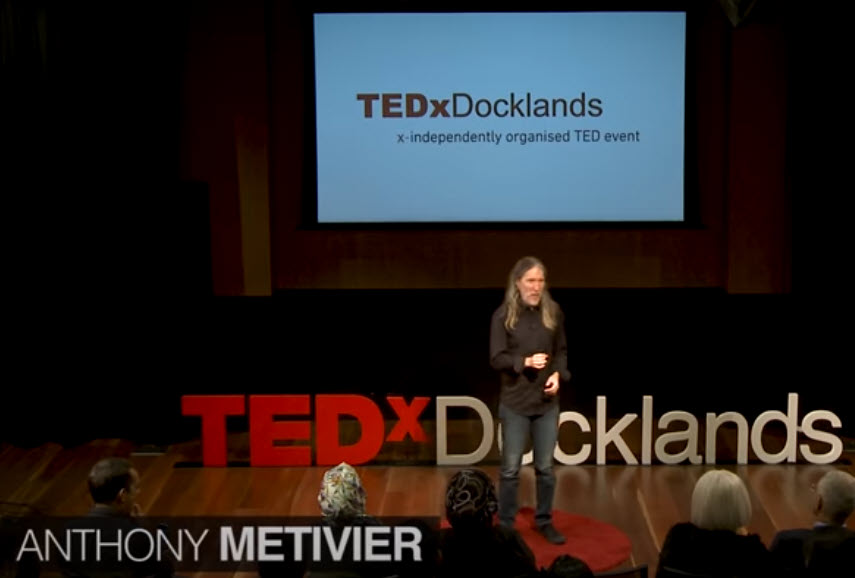
His talk got streamed almost 1 million times!
It’s got a particular single outcome for the person listening to the talk. And yeah it’s just an interesting thing to think through, you know, if I wanted to improve the podcast and I was deliberately trying to do it, then I might think of how could every single episode be a. A Ted talk, that sort of thing, but I don’t think I would have that much fun doing it that way, but that would be a way to improve it for sure.
You also had a lot of guests in your podcast, I think. Did you become a better interviewer or is it something that you need to practice to get better? Or did you not put a lot of thought into that question?
I’m not the person to ask whether I’ve become a better interviewer or not really that’s for the guests to answer and that’s for the audience to answer I really don’t know whether I become better at it or not. What I can tell you though, is that I have been more selective in who that I choose to have as a guest because it’s very, very important that you aren’t floundering (to experience great difficulties or be completely unable to decide what to do or say next) for some kind of answer or some kind of question but that you already can hit the ground running with the guests because you understand what they’re doing. Like you’re doing you obviously have spent some time sort of researching this area my show and so forth.
So I think if I’ve gotten better, it’s just simply because I pick my battles so to speak. I only am interviewing people that I feel like I can have a great conversation with, as opposed to interviewing for business reasons “oh, I got to have that guest because that’s trending or whatever”.
I just, I don’t do any of that sort of stuff. And I think that there’s no way to get better if that’s the game you’re going to play. Or at least I wouldn’t because I wouldn’t find that joyful. I wouldn’t find that fun.
Yeah, I understand what you mean. And in my case, for example, yeah. When it comes to learning English, I pick different interviewees that I can then talk about things that I love. And then it’s way easier for me to express myself and I can improve my English or other languages because for me it is crucial to feel at home to feel comfortable.
And when I’m feeling comfortable then I don’t have a lot of pressure and I can improve and I can speak better. How do you prepare before recording is there to some training involved or do your just hit the record button and you talk about the topic you want to cover? How does the process look like? How can we picture this?
It depends on the guest. So it depends on the guest and what we’re talking about. But one thing I’ve noticed over the years is that I get a lot of thank yous from book authors because I actually read the books that they have written. And often they do interviews with people who are just asking.

Standard stock questions. They haven’t actually read the book. They don’t even know what’s what it’s about, et cetera. So yeah if I’m interviewing somebody about their book, then I’m going to read their book. I’m going to spend that time or whatever the case may be. I’m going to do my due diligence (hard work) and I’m going to do it because I want to actually get their take (a version of something that shows someone’s attitude towards it) on something that I’ve read.
If I’m not going to go through their courses or go through their books or whatever the case may be. There’s no point in having a discussion.
Meditation to become a better speaker?
For example, you talk a lot about meditation as well. So for example, one of my thoughts was that maybe I could meditate also to become a better podcaster because the problem or the issue is when I am nervous I began to stutter and I can’t think clear enough, you know? And so maybe meditation would be some sort of a tool, a tool which could help me out with that too.
Well, I think it would definitely help you out but whether or not it would help you in a direct way would be something you’d have to experiment with and see. One way that it can definitely help you is you just mentally note: Oh yeah. I’m stuttering or I’m feeling nervous or whatever and then you just let it go because it’s already gone.
Right. That’s where meditation is really, really good.

Digital Amnesia / being overwhelmed
let’s talk about digital amnesia. I think this is a term. Which you created, is that right?
No, it comes from German, eh, dig, Digitale Demenz. I think they call it I’m not sure if that’s the exact German term but that’s where I first heard it in Germany. And it is so they’re dementia. And digital dementia is a very big concern and there’s been a lot of research done.
So unfortunately it doesn’t all get translated into English but some of the best sciences we all know is in languages and cultures and countries that just don’t get spread around because of the cost of translation and so forth. And digital amnesia was also a term used in English by Kaspersky. And they did a report about the problem.
And of course is a big software company. And for some reason they removed their research but I kept a PDF of it. So I have it still. And I imagine it’s a bit controversial because it seems that commercial companies would not be able to do some of the things that they’re doing, if they are in acknowledgement (the fact of accepting that something is true or right)of this problem.
But I don’t think that we have to throw the baby out with the bath water. We don’t have to throw away all technology just cause this is a, is a problem there’s ways to manage and deal with it.
Yeah, and it is kind of difficult sometimes because I get overwhelmed. Buy all the materials or all the resources out there. And I think a lot of learners struggle with that as well as it is difficult sometimes to get focused on one thing, because you have so many opportunities that, yeah, it has become a challenge to stay focused and to just work on one thing.
This is the problem, though, that challenge has nothing to do with digital technology. That challenge has always been there. You walk into a library, it’s got thousands of books. If you didn’t have digital technology, there are going to be people who are going to find that overwhelming.
The question is why do they find it overwhelming? It’s often very simple. They don’t have proper goals. They don’t pay attention to their diet. They don’t pay attention to their sleep and they’re not trained how to deal with books. They also don’t have proper metrics for dealing with information. So for example, this is where accelerated learning techniques come in very, very handy, because you’re taught how to think about information so that you can never be overwhelmed if you, if you have these tools.
And so when we think about the technology, what is unique and different about it is that it’s in our pocket. And it’s something that we see people all around us behaving with it in particular ways. They’re allowing themselves to be distracted and so forth, but those things there they are, again.
They’re not really new. There were phones that could distract. Do you know? And librarians had their phones were in the middle of the library. No, in an office with a closed door and the sound was blocked so that not everybody in the library was disturbed by it. So we can just also turn off our phones, put them in different rooms, et cetera.
So I don’t, even though there is the real problem with digital dementia has to do with something called dual path readership. And it’s the fact that people are scrolling. And they’re scanning and they’re, they’re skimming in a way that the technology enables and they’re not really reading and they’re doing it in an environment that is competing for their attention and draining some part of their attention, but overwhelm and feeling overwhelmed that is simple to solve.
That’s called having goals. It’s making sure your blood sugar levels are well modulated and regulated through sleep and diet and exercise. We know that if you exercise, before you sit down to learn, you’re going to be much more concentrated and focused. So at the end of the day, when we talk about digital dementia, we are talking primarily just about dementia.
Like people just forget to take care of themselves. And that has nothing to do with any technology,
it has very little to do with it. Let’s put it that way.
Why Anthony did not struggle when he learned German
And what were you struggling the most when you were learning German?
Oh I didn’t really experience a struggle with it. You know, this is the, I received an email from somebody today because I asked people when they joined my email list, I said, you know what, what’s your biggest struggle? And he said something that I’ve only seen once in my entire career of doing this eight years full time, he said, I don’t surrender to struggle. And I’m like that too. And so my personal story is I just, I didn’t struggle with it. You know, it’s there, this is, this is a choice. So many people just aren’t there. They’re not taught mental strength, which is that, yes, this is complicated. Yes. There are a lot of things to do here, but set of whimpering in a corner and humming and hawing about it.
Well, what are we going to do? Well, there’s strategies. So what are those strategies? And then you learn them and then you apply them. Now, you know, I’m also very aware that when I say that I’m just a lucky person, you know, I had a very stubborn father. If he was going to get something done, he figured out how to do it.
So I, again, this comes back to observing the behaviors of others. I was able to observe a problem-solver and that gave me a certain advantage. However, when we think of the internet and what’s so great about it, Everybody can choose almost everybody to go and observe people who are good at stuff. Right.
And then you just do what successful people do. So, yeah, I’m not, I’m not particularly frustrated with many things because there’s always a model. And if somebody else can do it, that means I can do it too. It’s just, am I going to focus on it and so forth? So frustration is a choice.
The right Mindeset and acknowledging your fortune
I really like your positive thinking there. And so finally what you’re saying, it’s a question of your mindset.
Well it’s mindset but it’s mindset plus acknowledging your fortune. That you have that mindset. So anybody listening to this now imagine the world as a giant pinball machine, and somehow your balls are floating. You’re a ball in a pinball machine, and now you’ve just bumped up against my ball. And that’s a fortunate thing.
If you resonate with it, maybe you’re having a bad day and you’re like this, this guy is a total jerk, right. that can happen. Or maybe you’re having a really good day. And you’re like, yeah, I got to go and find out more about this stuff. But nonetheless, if you can just develop a simple habit of being grateful for everything that happens right or wrong, good or bad, and acknowledge that you’re just lucky to be on the planet in the first place.
Everything’s going to change. It’s not a, it’s not even about positive thinking. It’s just about understanding math. It’s an understanding chance and luck and how fortunate you are because everything that is good in your life. It’s not necessarily possible for it to be better, but it sure is how it could be a lot worse.
Right. And so many people are focused on what is bad instead of understanding what could be worse about it. Right. And so, you know, I thinkmy whole pointis that I’ve always just been fortunate enough to be stubborn. And I have become over years of practice with meditation aware of. Just how lucky I am and how lucky most of us are, and that changes everything.
And that’s where the meditation thing comes in. So if you’re going to use meditation to become a better podcaster or a better language learning speaker, really the name of the game there. Is not to somehow be better. Quote, unquote better. There is no better. This moment is the best. There is no better coming because this is the best.
This is the yeah. It’s Naperville ultra. I think it is. As a term for this, it is the best it’s ever going to be. So I always encourage people stop looking for better start looking for now, cause this is it. And it is so incredible and you are so gifted to be part of it. It would be so much easier for the universe to not have produced you, you know, but it did.
And so here you are and all time spent on frustration and all that. Well that maybe that’s just part of the universe too, but I’m grateful for those things as well, because they’re just there. They’re just part of the present. They’re not going away.
Anthony’s next book
Yeah, I really like your answer. It’s just fantastic. That is really great. maybe you could say a few words about your future book, which you mentioned in the beginning.
Well, it’s being written now and I don’t always know what my books are going to be about when I’m writing them. But it’s about what we were talking about. It’s like, why are people constantly dissatisfied? There must be a reason and there must be a reason why that dissatisfaction exists. So if you, if you take evolution and evolutionary science, It would have gotten rid of dissatisfaction if it didn’t serve a purpose.
Right. So what is the purpose of dissatisfaction and how do you train yourself to be satisfied with dissatisfaction? And that’s pretty much what the new book is about and to see why evolution has included dissatisfaction in his model. So to speak. And I don’t pretend that my little three pound brain is going to figure it all out, but at the same time, it’s already figured out, to my satisfaction and to the satisfaction of every Zen master.
You know, this is what Zen is all about. So it’s almost like a book about Zen because Zen.
Yeah.
Zen is a guide to being satisfied with dissatisfaction. And it has been for many, many thousands of years.
Did you like the format?
Then you might also like ep.28 about the interview with teacher Luke Thompson from Luke’s English podcast.
Have a listen to Ep. 59 Essential mindset to boost your target language skills
Please subscribe to the podcast so that you won’t miss any episode.
Share your thoughs with us!
Send a voice message and share your opinion with us!
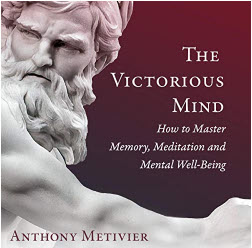
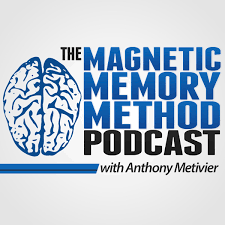
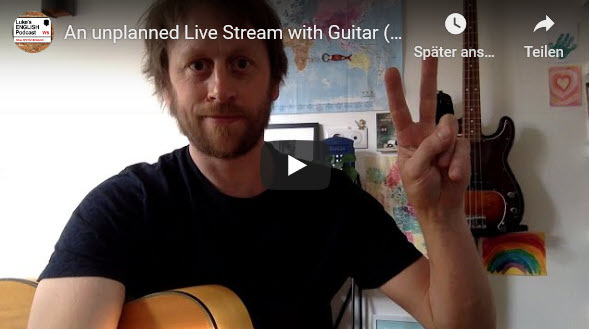
1 Trackback or Pingback